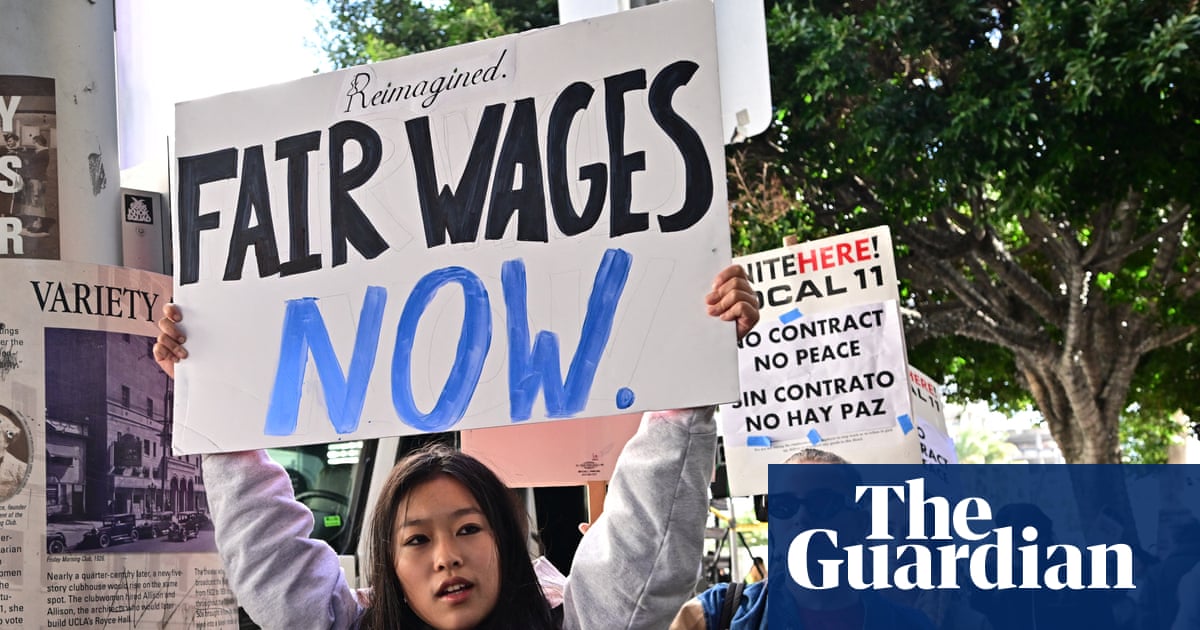 [ad_1]
[ad_1]
About 13,500 hotel workers across Boston, Honolulu, Providence and San Francisco will vote on whether to strike this week as they push for significant wage increases and protections against job cuts.
Employees at leading chains including Hilton, Hyatt, Marriott and Omni will decide in the coming days whether to approve the walkouts. The hotel industry stands accused of having used the Covid-19 crisis to reduce staffing and increase workloads.
Workers were hit on multiple fronts in recent years, as thousands faced layoffs and furloughs during the pandemic, only to return to work with stagnant wages as inflation soared, and higher workloads due to policies such as the elimination of daily room cleanings, causing rooms to be messier and coinciding with staff reductions.
Now Unite Here is launching the first wave of strike votes among more than 40,000 hotel workers it represents across 20 cities in the US and Canada, who face union contract expirations this year.
If workers vote to authorize a strike in the first four cities, one can be called at any time once their contract expires, with some already having expired, and others set to expire by the end of August.
“The hotels are not thinking about their workers, they’re only thinking about the money that they make,” said Anabel Castro, a housekeeper at Marriott’s Westin Moana Surfrider in Honolulu for over 20 years. “They should give us what we’re asking for. We’re only asking and fighting for what we deserve.”
Castro was out of work for about two years following the onset of Covid-19, which prompted shutdowns across the hotel industry in March 2020. She made desserts and sold them to try to make up the income she lost from being furloughed.
But now she is still struggling, working three jobs to support herself and her family, while having to take on extra workloads since she returned to work at the hotel, where she cleans 14 rooms a day. “It doesn’t matter how many checkouts we have, and when we have checkouts, it’s really messy,” explained Castro. “Sometimes you have to return to the rooms because of the condition the rooms are left in.”
Theresa Fiorino, a room service cashier at the Hilton Boston Logan Airport for 29 years, said workers at her hotel were asking for a $10 wage increase over four years of the contract but claimed the hotel was not even meeting the workers halfway on their proposal.
At the start of the pandemic, Fiorino was furloughed. “That day, I was pretty much in tears because I didn’t think I was ever going to walk back in that building again,” she recalled.
But when she was eventually brought back to work in the room service department, she said staffing was reduced, forcing her and other workers to take on extra workloads. She works another part-time job as well, to try to cover basic living expenses.
“They’re running everything bare minimum,” claimed Fiorino. “The cost of everything is insane. Nobody can survive. One job should be enough, but that’s just not the case.”
Hilton and Marriott did not respond to multiple requests for comment.
Other hotel workers have also criticized staffing reductions, workload increases and policies that came out of the pandemic such as the elimination of daily room cleanings in hotels.
“I sleep with pain, I wake up with pain, I go to work with pain,” said Jianci Liang, a housekeeper at the Hilton Boston Park Plaza for seven years. “Since we returned to work after Covid, there are about 20 fewer room attendants on the regular schedule. Without the proper staffing, my job is getting harder and harder.
“When the rooms are sold out, we have to cover the work of the missing people. I have no choice but to work, because it’s hard to save money or set aside funds for an emergency.”
Hotel staffing per room occupancy decreased by 13% from 2019 to 2022 in the US, Unite Here has noted, while US hotel industry profits surpassed 2019 levels to reach $101.3bn in 2022.
“Momentum is building for strikes this year because workers are at a breaking point while the hotel industry is making record profits,” said Unite Here’s international president, Gwen Mills. “Hotel companies took advantage of Covid to make severe cuts to staffing and guest services, and now workers say that their jobs are more painful than ever.
“Meanwhile, wages aren’t enough to cover the cost of living, and many workers have two or even three jobs. This is a fight about the future of the industry for guests and workers alike, and our members are putting the hotels on notice that they’re ready to strike for what their families need.”


